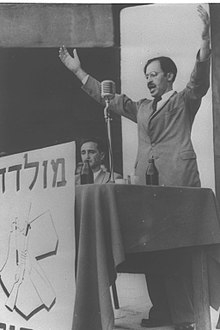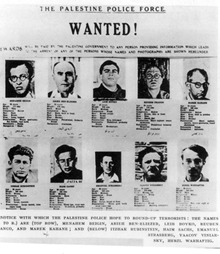


“Upheaval: The Life and Journey of Menachem Begin” is an adoring profile of the combative right wing Israeli prime minister who shared the Nobel Peace Prize with Egyptian President Anwar Sadat for courageously negotiating the Camp David Accords, ending decades of Egyptian-Israeli conflict.
An army of Begin’s fans — Knesset members and colleagues from his cabinet to assorted sympathetic authors, journalists, conservative Israelis on the street old enough to remember his seven year rule, two Israeli ambassadors to the U.S., a couple of American diplomats, Begin’s personal secretary and U.S. Senator Joseph Lieberman all sing his praises and color in his personal story, showing us the Zionist struggle, which he began in Belarus in his youth, that shaped his life.
The film is straight-up hagiography. The closest “Upheaval” gets to a contrarian view of Begin’s militant, combative and eventually-scandalized career is the presence of Jordanian-born think-tank member Ghaith Al-Omari. Where are the critics, at home and abroad, who might lend balance and thus authority to this film?
It’s worth stating upfront that this is a film from the director of “The Yoni Netanyahu Story,” a 2012 film about the Entebbe Raid commando timed to fluff the image of Israel and its controversial and then-embattled, now-ex prime minister, Netanyahu’s brother Bibi.
Right Wing Israeli hagiographies are pretty much filmmaker Jonathan Gruber’s brand, and this echo-chamber portrait is much in keeping with that. Take it’s conclusions with a sack full of grains of salt.
Begin’s early life has been widely discussed, but it remains fascinating to take in. He was radicalized early, and his years of Zionist activism led the Soviets to throw him into a Gulag, only to release him to fight the Nazis in the Middle East during World War II. Begin emigrated to Palestine and fought the British instead, which probably didn’t bother the Russians that much.
He led the Jewish militant group Irgun, labeled a “terrorist organization,” which blew up British trains in Palestine and later the British headquarters of the protectorate, the King David Hotel, in an effort to force the British out so that the Jewish immigrants could declare an independent Israel. That’s his picture on a British wanted poster.


“Upheaval” paints an interesting picture of the “Jewish civil war” that nearly broke out as Begin set himself in opposition to other founding fathers of Israel like David Ben-Gurion in the late 1940s. It makes him come off as statesmanlike for not letting something he was about to cause happen.
After decades as leader of the opposition far right Likud Party, Begin became prime minister in 1977, and “Upheaval” shows the ways his seven year rule changed Israel’s shape and security and planted the seeds for strife that continues to this day.
Begin pushed the peace process with Egypt at a time when most Israelis were opposed to that. He spoke publicly about making one state where Jews and Arabs could co-exist. Then he ramped up Israeli settlement building in lands won in the 1967 Six Day War. Labeled as “honest” and “a mensch” by everybody testifying here, the viewer hears him playing semantics games — “We don’t use the word ‘annexation.’” And we see him and hear him start the ongoing Likud “settlements” talking point, citing the Bible as proof of “ownership” of the lands of historic Israel, Judea and Samaria. Begin was the Likud prime minister who normalized the party’s embrace of conservative religious sects and their far right politicians.
The de-facto result of this process of taking Palestinian land for Jewish settlers has another name in other parts of the world — “ethnic cleansing” — with the Israeli Defense Forces backing the settlers up. “Apartheid” has come up in international criticism of post-Begin Israeli governing.
Begin’s tolerance and acceptance of the Palestinian Arabs within the state is played-up in “Upheaval,” as is his championing of civil rights for such people when Likud was a minority party.
But more important to Begin was welcoming in Jews from Africa and the Middle East and mending fences between those populations. When he and his apologists here remark on his embrace of “multi-culturalism,” they’re too tone deaf to acknowledge that he always punctuated such declarations with “of the Jewish people.” Jewish ethnicity and Jewish culture were his obsessions.
I noted the film’s one contrary voice, mentioned above, in this chorus of adoration and endless rationalizations of everything controversial Begin said or did, the one expert who noted Begin’s “fascist” reputation, his fame built on “a lot of violence against Arabs.” I wanted to know who this was giving a more measured account of the man. Unlike every other of the scores of expert witnesses on camera in “Upheaval,” Ghaith Al-Omari isn’t identified until very late in the film.
Gruber starts the movie with a montage of news accounts of anti-Semitic attacks worldwide justified by their attackers as anti-Israeli, and that sets the film’s tone. He sentimentalizes a bellicose man famous for perfecting the “any means necessary” pre-emptive military/foreign policy by divorcing a violent world today from the violent “upheaval” that began the moment the word “Zionism” was coined, and the blowback today that still seems like shockwaves from the “upheaval” this “mensch” created.
There is interesting historical material and some cogent analysis of the man, his psychological makeup and career in “Upheaval.” But like Begin himself, any time something unsavory starts to emerge about himself, he would gush and gush about his wife. Gruber’s film plays that sentimentalizing trick, too, by slipping in such gushing here and there.
One thing Gruber either doesn’t realize or is loathe to embrace is that his films, focusing almost exclusively on people who share a view and an agenda he is pushing, have no authority.
Movies like “Upheaval” are more propaganda than history
MPA Rating: unrated, scenes of violence
Cast: Menachem Begin, Dr. Avi Shilon, Stuart Eizenstat, Joseph Lieberman, Ghaith Al-Omari, Yona Klimovitsky
Credits: Scripted and directed by Jonathan Gruber. An Abramorama release.
Running time: 1:27

